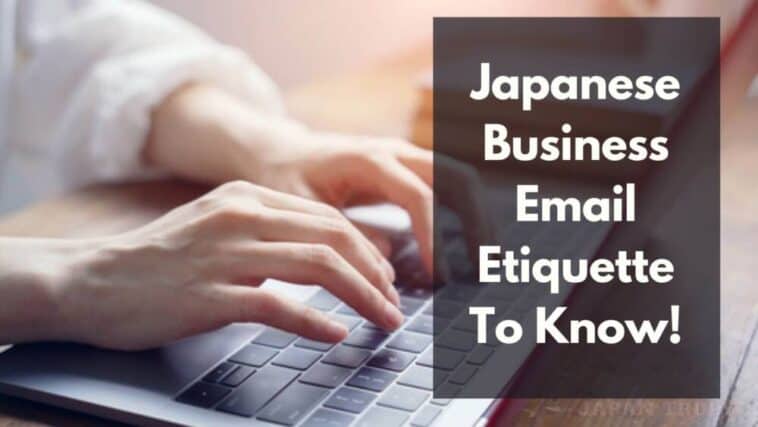Wanna learn Japanese business email etiquette? Here are the most important etiquettes you need to follow when writing an email to Japanese business persons. Check it out!
Email communication is one of the most important aspects of any professional collaboration. In Japan, however, adhering to the conventions of Japanese business email etiquette is essential for fostering successful collaborations and projects.
Japanese business email etiquette is increasingly seen as an important factor for those wanting to do business in Japan, as it helps demonstrate respect for traditional values and cultural norms.
In this article, we will discuss the basics of Japanese business email etiquette and examine how it is used in professional contexts.
Page Contents
Japanese Business Email Etiquette To Follow!

When it comes to writing a Japanese business email, there are a few etiquette rules that should be followed.
First and foremost, take extra time to convey your message in the best possible way. Japanese is a nuanced language, so it’s important to choose the right words when expressing your ideas.
Secondly, use honorific language when addressing someone with a higher rank in the company. This shows respect, and it’s often expected in Japan.
Thirdly, avoid the use of contractions or slang. You should be formal and respectful in your language, so as not to come off as too casual.
Lastly, always draft your message in a professional, but polite tone. Remember, in Japanese business culture, respect is held in high regard, so be sure to show it in the way you communicate.
With these simple tips, you can ensure that your emails have the best chance of being received positively.
Salutation When Sending A Japanese Business Email
When sending a Japanese business email, knowing which salutation to use is key. A good rule of thumb is to use a formal salutation such as ‘Ohayou Gozaimasu’ or ‘Konnichiwa’.
When emailing someone you don’t know, you should use a speculative salutation such as ‘Gokigenyo’ or ‘Mata Raishu’.
Using the proper salutations will not only help to show your respect for the recipient but will also make it easier for them to understand the context of your message.
When emailing a superior, you should also use a formal greeting, such as ‘Ohayou Gozaimasu’. Such a greeting signals respect and recognition of the other person’s status.
When emailing a client, it is good practice to use a respectful salutation such as ‘Shitsurei desu’ or ‘Shitsurei Shimasu’.
In conclusion, it is important to remember that there are many different salutations that can be used when sending a Japanese business email. It is important to use a salutation appropriate for the context and level of formality of the relationship.
When in doubt, it is best to stick to a formal salutation to show your respect for the recipient.
How To Properly Address the Recipient In A Japanese Business Email
When writing a Japanese business email, it is important to ensure that you address the recipient in a respectful way. The most common form of addressing the recipient is to include their name and title, such as “Mr. Tanaka” or “Mrs. Yamada”.
For those without a title, you could use the honorifics -san or -sama. “-san” is a term of respect for people in general whereas “-sama” is reserved for those of higher status.
This should be followed by a salutation such as “Dear (name)” when starting the email.
It may also be appropriate to use the Japanese phrase o-negai shimasu to start off your email. This phrase is a polite form of request which implies that you are asking the recipient for their time, attention, and help.
If you are aware of the recipient’s culture, then it is essential to tailor your email to include cultural elements that they can relate to, such as appropriate phrases, salutations, and greetings.
Although Japanese business emails are typically shorter and more concise, writing with emotion and personality can be beneficial in forming a positive relationship with the recipient.
Using polite language and making sure to thank them for their time is important to building a respectful relationship.
Being mindful of the content of your emails and selecting an appropriate language is vital when establishing successful communication with the recipient.
Should You Write a Japanese Business Email in Japanese or English?
When it comes to composing a Japanese business email, there’s often a debate about whether English or Japanese should be used. The truth is, it really depends on the language proficiency of the sender and the recipient.
If both parties are proficient in Japanese and English, it is recommended to compose emails both in Japanese and English. If only one party is proficient in either language, then the email should be sent in that language.
On the other hand, international business often requires emails written in English. Whenever an overseas partner is involved, an English business email should be sent. This ensures that all relevant parties can understand the contents of the email.
Of course, if a partner is unfamiliar with English, you can also opt to send a bilingual email, using both English and the partner’s language.
In sum, depending on the relationship between the sender and the recipient, it is wise to be mindful of which language you should use when composing a Japanese business email.
When in doubt, always opt for the language that both parties are most comfortable with, as it will show both cultural sensitivity and respect.
How To Reply To A Japanese Email
The most important rule when replying to a Japanese email is to use formal language. In the Japanese language, words have different levels of formality depending on the relationship between the person sending the email and the person receiving it.
Therefore, it is important to choose polite and honorific words that show respect and deference.
When replying to a Japanese email, it is important to include additional words of gratitude. This is known as “keigo” in Japanese, and it is considered to be appropriate when responding to favors, invitations, and requests.
Common expressions of courtesy include “Arigato gozaimasu” (Thank you very much), “Gokagen ni itashimasu” (I am very grateful for the trouble you went to), and “Osoreirimasu” (I apologize for the inconvenience).
It is also important to include a polite closing phrase when replying to a Japanese email.
Examples include “Otsukare sama desu” (Thank you for your hard work), “Mata yoroshiku onegaishimasu” (I look forward to working with you in the future), and “Dōyō ni omachi kudasai” (I am looking forward to hearing from you).
At the end of the email reply, it is also important to include a polite indication of the action that will be taken.
This can be either a positive or a negative indication, depending on the topic at hand.
Examples of positive responses include “Moushiwake gozaimasu” (I will do as you suggest), “Yoroshiku o-negai shimasu” (I would be delighted), and “Kangeki desu” (I am excited).
On the other hand, examples of negative responses include “Gomennasai” (I am sorry), “Shitsurei desu” (I apologize for the inconvenience), and “Mochiron” (Of course).
By following these tips, you can make sure that your replies to Japanese business emails are written in an appropriate and polite manner.
Not only will this help you to make a good impression, but it will also demonstrate that you understand and respect the conventions of the Japanese language and culture.
Should I Add -san or -sama to Recipient Name in a Japanese Business Email?
When composing business emails in Japan, it is crucial to recognize the custom of adding honorific language when writing to colleagues or superiors.
The rule of thumb is to always include the honorific -san or –sama after the person’s name. After all, respect is a major component of Japanese culture and in business, especially, it is important to demonstrate respect and polite etiquette.
Knowing which honorific to use, however, can be a bit challenging. The “-san” title is used for those of an equal or lower rank than you, or for someone in a customer service role. It means “Mr.”, “Mrs.”, “Miss” or “Ms.”
When addressing someone who holds a higher rank or is of higher status than you, such as a client, professor, or CEO, you should use the “-sama” title. This is a more respectful way to address someone of higher standing than you.
Conclusion
In conclusion, Japanese Business Email Etiquette is an important aspect of communication in the business world.
Writing with personality, empathy and emotion, using a variety of words, sentence structures and synonyms, can be incredibly effective in conveying messages more clearly.
Adhering to these guidelines can help build greater bridges of understanding, communication and collaboration between teams, both inside and outside of Japan.
Also Read
My writing focuses on the various aspects of Japanese lifestyle, from traditional tea ceremonies and flower arrangement to modern fashion trends and pop culture. Through my articles, I aim to share my passion for Japan and provide readers with a glimpse into the rich and diverse world of Japanese culture.
I believe that the key to understanding Japanese lifestyle is to appreciate the balance between tradition and innovation. While Japan has a rich cultural heritage that dates back centuries, it is also a country that is constantly evolving and embracing new ideas and technologies.
Whether you’re interested in learning about the latest fashion trends in Tokyo, or want to explore the ancient art of calligraphy, my writing will take you on a journey through the many facets of Japanese lifestyle. So join me as we explore the beauty and complexity of this fascinating culture together!





